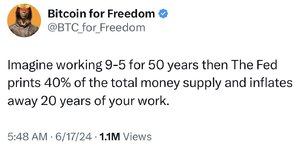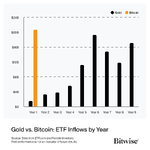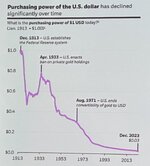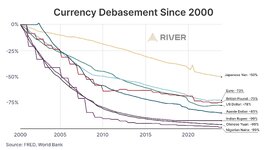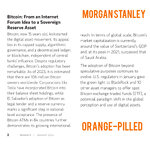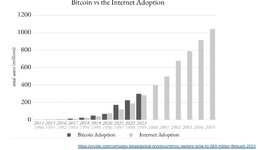Prices have increased over the last few months but the US election seems to be what ppl are waiting on the result of. Should Trump win which he most likely will you’ll see mass price increases over night due to his standpoint on crypto. Harris is now making positive statements about the industry.Any guesses as to when the next bull run will really take off?
You are using an out of date browser. It may not display this or other websites correctly.
You should upgrade or use an alternative browser.
You should upgrade or use an alternative browser.
Bitcoin News Thread
- Thread starter VladKinder
- Start date
Coinbase is a crypto trading platform. It’s nothing like a bank.I don't have any faith in anything related to it being used in a meaningful way at any point. I'm merely dismissing your dismissals as misinformation because that is what they are.
Nobody can move my money, from any account without 2FA
Not true. You can have your assets frozen by your bank. It might seem like they are there to protect you but there have been plenty of people that have had account frozen incorrectly. Not just criminals. Your bank can go bust as well and then your money is gone.
That's the thing though, most people who hold crypto will have very little clue about what it is or does, that's not a good thing, and plays into the hand of those who can game the system/ volatility.
Most people don't understand how anything they own works. You don't really need to. People don't fully understand the banking system. I don't know how me pressing a keyboard makes these words appear. You don't have to understand something to own it.
What happens if coinbase goes bust or whatever?
Coinbase is essentially the same as a bank. It isn't bitcoin. Properly regulated though it would operate like any investment company which is required to hold customers assets separately from their own (unlike a bank that are allowed to take deposits and then give out loans on that money many times over).
I wasn't trying to demonstrate anything being right or wrong. It was a basic example of how a distributed ledger is different to a centrally held one. Change it from cash and compare an inventory system or whatever. It's just an example for someone who asked what happens if the internet was switched off.
Bitcoin is an open source decentralised technology so no one owns it. There wouldn’t be anyone for your colleague to contact as nobody owns it. No one should be acquiring cryptocurrency and doing anything other than storing it on a hard wallet. If you do so you cannot be hackedA colleague of mine has had a bitcoin stolen from him and been completely unable to recover. Not sure what wallet he was using but someone managed to hack it, change his email address and take it. A chunk of the blame is on him for not checking regularly enough but he wrongly assumed it was secure and safe. They won’t even respond to him.
The likelihood of that happening is essentially 0. If it was to happen a modern war couldn’t be fought and fiat currency would mostly disappear as it’s virtually all numbers on a ledger. Your bank card wouldn’t work to withdraw money and the run on the banks would collapse the global economy.What would happen if the internet went down, say during a global war?
Would it still be possible to trade Bitcoin and Crytocurrencies?
Redwurzel
Well-known member
Correct - but its a remote possibility still and in that remote possibility Gold can be used and would be accepted much of the time. Some people are talking about the Ukraine war spreading out of Ukraine and very likely will if Ukraine is given long range weapons. Also in the Middle East a Israel against Iran war looks a decent possibility. These wars could easily drag other Nations in.
Hence when major wars threaten the gold price rises.
With Bitcoin and Crypto I still think its early days - the stuff only been around for about 12 years and market is not fully developed hence quite large volatility. Central Banks are buying more Gold at present, are they also buying Bitcoin and other Crypto? and in the same quantities by value?
Hence when major wars threaten the gold price rises.
With Bitcoin and Crypto I still think its early days - the stuff only been around for about 12 years and market is not fully developed hence quite large volatility. Central Banks are buying more Gold at present, are they also buying Bitcoin and other Crypto? and in the same quantities by value?
It's just an opinion, similar to what most investors who don't hold much crypto think.
My limited knowledge is seemingly proportional to your faith that they're going to get used in a meaningful way anytime soon. Like I mentioned, I've got a small amount of crypto though, as the greater fool thing does seem to work well.
That's the thing though, most people who hold crypto will have very little clue about what it is or does, that's not a good thing, and plays into the hand of those who can game the system/ volatility.
The table I quoted seems to have terrible knowledge of currencies and wealth stores we've been using for 100's of years.
The dollar is practically digital, about 0.000001 of my wealth/ cash is in the UK physical form/ £ etc. I've actually got about 10 more currencies in physical forms than I do pounds, as I intentionally do not carry or want cash.
Bank databases are backed up many, many times, in multiple places I expect, never mind the records that the individual can keep. I keep 7-10 years worth of statements, as well as all the records from trading platforms etc, I need these for self assessment so that's good enough proof for me. Each account protected by the FCA up to 85k, so I keep funds in separate places.
Nobody can move my money, from any account without 2FA, I've deemed that more than safe enough, and could go safer if I wated to. The money in the bank is insured, and the bank is regulated by the FCA, nobody is breaking in and stealing my share of the banks cash. If someone writes their crypto wallet/ access codes down then it's a security risk, it's even a risk if stored on a computer or if stored in a encrypted file. The protection people have over their login info is a lot less secure than how banks protect their login info. How many have their crypto details wrote down on a bit of paper, my guess is most.
What happens if coinbase goes bust or whatever? Aren't the general public unsecured and not insured/ protected? What happened when FTX went bust? There seems to be a lot of crypto scams about, but there are scammers in everything.
$ get confiscated and frozen when crimes have been committed, that's a good thing. Not being able to do that with crypto is a bad thing, as it opens the door to illegal activity. Drug dealers would use it more if it wasn't so volatile.
You're using what is off our planet as an excuse that Bitcoin is better than gold (I'm not saying gold is a good investment mind)? The sum of every rock ever brought back to earth by man is < 500kg I think, ever, and all of that has come from the moon (don't think that has any gold). We've never sent anything to Mars which has came back, never mind Jupiter which is 7x further. If we got gold back from mars it would be the most expensive gold ever recovered, by a hell of a long way. Probably a million an ounce, rather than the $2,000 an ounce it costs here.
It's easy to invest a $ in the entire world (extremely diversified) and beat inflation by 6%.
Large bitcoin holders can really effect the price, 0.01% of them have 60% apparently? Nakamoto invented it and supposedly has a stash of a million bitcoins apparently, and nobody knows who that is do they?
Sure the US gov can print money, doing this comes in handy though times of struggle, this is a good thing. They can also take dollars out of the system, which can also be a good thing. Despite printing loads of $ during covid, the value of the dollar has remained pretty similar v other countries, largely as they printed money too.
If one main crypto does get some use then either the others will fail immediately as potential in the others dies, or they all go up and then later fail when people still realise they have no use. For them all to "win" they need absolutely monumental use. By win, I mean taking over major currencies in the world for actual use and there at least 10 currencies which are obviously massive and used daily all over the world. They're going to be harder to shift.
I thought the idea of smart contracts seemed good a few years back, for like with Ethereum, but the problem is they're too volatile for big ongoing contracts which have tiny margins. Also, what happens in a dispute or one person says they met the criteria and others say they don't? Project bank accounts often get used now with big contracts, like on construction etc, these can take away risk for one side, and not really increase the risk of the other, could be difficult to beat those.
I wouldn't class something heavily volatile as a store of value, generally with things like that people don't know when they might need full access to it, so they're not going to want it to be too volatile.
I don't invest much in gold, probably a small % held in some account to hedge against crashes, but I'm pretty certain it bets inflation long term, a lot use it as an inflation hedge but that's probably more suited to old people. Younger folk can take more risk and get more growth and use something like the S&P500 or all cap to hedge against inflation.
You're right about those in poor countries with a poor currency, their own currency can be dangerous, and feast or famine, but I would assume those with internet access are also able to get a bank account and invest outside of their country, to make it safer. Some countries are poor for this though, and this is probably why some locals abroad happily accept dollars, and some prefer them. No idea what the people do who don't have a bank account, but I imagine most don't have internet access either.
The way I see it, everything has a place, but people just need to be aware of what things are good at and what they're very bad at. It's going to be different with everyone too, largely due to age, and when they might want their money, or when they might need it.
I see it something like the below:
Crypto - Extremely volatile, high reward but also potential of high losses, time that wrong and it's very dangerous, potential for very long periods of massive negative equity, ie 2017 to 2020, or 2021-2024, if timed wrong, but regular investing can help solve this.
Individual stocks - volatility depends on the company, most won't get the returns of crypto, but most won't have the troughs as deep either, could have a couple of years of negative equity, if timed wrong, but regular investing can help solve this.
S&P 500/ Global all cap - About as safe as you can get long term, as extremely diversified, good returns if you can put up with possibility of temporarily troughs of around 30%.
Property - ie pay of the mortgage, good if the rate is high, bad if the rate is good, should also beat inflation
Gold/ Bonds - less volatile than stocks, beats inflation, but not a great return, fairly safe
Savings accounts - most barely match inflation, but good for easy access
Bank accounts - gets eaten by inflation, very easy access
Physical cash - gets eaten by inflation, very risky to hold large amounts (theft/ damage etc)
Crypto almost certainly will be up in 10 years, but the key thing is from what date are you starting to look at and what date are you ending on? i.e from what price to where and when? Some will get this right, a lot will get it wrong. Seems risky to just lump in, especially after a big rise as after each time that's happened there's been a big drop for time. Chucking small amounts into it each month will probably work out ok though if people have a lot of time.
All money is just numbers and paper. Numbers are worthless as is the paper. It’s the gold that provides the value. There’s a genuine threat further down the line to fiat and digital currency through quantum computing. Once it advances further quantum computing can solve cryptography in seconds and breach its security. It could breach all data centres and online crypto wallets. Store crypto on a hard wallet like a nano ledger and it’s not possible to breach it. The world hasn’t figured out the threats of AI yet let alone quantum computing. Most people have no understanding of technology including governments. Quantum computing can’t steal gold or cryptocurrency stored on a hard wallet. Everything else is under threatCorrect - but its a remote possibility still and in that remote possibility Gold can be used and would be accepted much of the time. Some people are talking about the Ukraine war spreading out of Ukraine and very likely will if Ukraine is given long range weapons. Also in the Middle East a Israel against Iran war looks a decent possibility. These wars could easily drag other Nations in.
Hence when major wars threaten the gold price rises.
With Bitcoin and Crypto I still think its early days - the stuff only been around for about 12 years and market is not fully developed hence quite large volatility. Central Banks are buying more Gold at present, are they also buying Bitcoin and other Crypto? and in the same quantities by value?
You’re correct that most crypto technologies are still in their infancy. Many are open source techs that are being developed by a community not employees. Therefore they’re not techs like Silicon Valley that are VC funded and have to float to pay back the investors over a short period. The World Wide Web was the greatest human example of libertarianism and crypto is essentially one of the few examples of that. Most of the WWW is now entrenched in capitalism and political football games. The blockchain is the third evolution of the WWW and will make major changes to individuals, businesses, politics and society.Correct - but its a remote possibility still and in that remote possibility Gold can be used and would be accepted much of the time. Some people are talking about the Ukraine war spreading out of Ukraine and very likely will if Ukraine is given long range weapons. Also in the Middle East a Israel against Iran war looks a decent possibility. These wars could easily drag other Nations in.
Hence when major wars threaten the gold price rises.
With Bitcoin and Crypto I still think its early days - the stuff only been around for about 12 years and market is not fully developed hence quite large volatility. Central Banks are buying more Gold at present, are they also buying Bitcoin and other Crypto? and in the same quantities by value?
Last edited:
VladKinder
Well-known member
I have 10% of my portfolio in Bitcoin (no other crypto).
The likes of Blackrock are actively telling their customers they should have at least a couple of percent in their portfolio,
which will not only lead to better compounded returns over the long term but will improve their sharpe ratio (risk/reward).
Anyone who is interested in the the history of money will know that all fiat currencies eventually go to zero due to money printing/debasing.
Bitcoin is not a get quick rich scheme. It's not a case of buying some then hoping for a quick profit. It's very long term way to protect yourself and your savings
against corrupt and useless governments and uncertainty.
The likes of Blackrock are actively telling their customers they should have at least a couple of percent in their portfolio,
which will not only lead to better compounded returns over the long term but will improve their sharpe ratio (risk/reward).
Anyone who is interested in the the history of money will know that all fiat currencies eventually go to zero due to money printing/debasing.
Bitcoin is not a get quick rich scheme. It's not a case of buying some then hoping for a quick profit. It's very long term way to protect yourself and your savings
against corrupt and useless governments and uncertainty.
Precisely. US national debt is now around $35 Trillion and growing. There’s a tipping point. It’s not sustainableI have 10% of my portfolio in Bitcoin (no other crypto).
The likes of Blackrock are actively telling their customers they should have at least a couple of percent in their portfolio,
which will not only lead to better compounded returns over the long term but will improve their sharpe ratio (risk/reward).
Anyone who is interested in the the history of money will know that all fiat currencies eventually go to zero due to money printing/debasing.
Bitcoin is not a get quick rich scheme. It's not a case of buying some then hoping for a quick profit. It's very long term way to protect yourself and your savings
against corrupt and useless governments and uncertainty.

